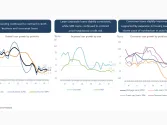Hong Kong faces likely shortage of 60,000 elderly residential places
JLL expert urges swift action to shelter the growing elderly population before other demographics share in the same housing woes.
As the elderly population in Hong Kong continues to grow, the city faces a pressing need to address the potential shortage of 60,000 elderly residential care places, according to global real estate services firm JLL.
Tom Parker, institutional clients director of Value and Risk Advisory at JLL in Hong Kong, brought up the situation and recommended that steps be taken to ensure accessibility and quality of care for its senior citizens in a recent interview.
“The gap between the number of elderly places available and the senior population is substantial and requires immediate action to develop the sector further and provide suitable housing for our senior population,” Parker told Hong Kong Business.
Presenting the numbers, he said that Hong Kong is home to approximately 2.2 million elderly citizens, who account for about 20% of the city’s population.
In contrast, there are only around 79,000 elderly residential care places available, resulting in a ratio of just 39 elderly places for every 1,000 residents. This is one of the lowest ratios among developed countries.
To put it in perspective, most other markets have a ratio of around 60 to 70 elderly places per 1,000 senior residents, highlighting the significant gap that needs urgent attention.
The urgency to address this issue is intensified by the fact that Hong Kong is experiencing one of the fastest-growing elderly populations globally.
Projections indicate that by 2050, Hong Kong will have the world’s oldest population. This makes it crucial to take prompt measures to bridge the gap between the growing senior population and the limited availability of suitable housing.
Based on current estimates, the senior population will grow by approximately 46% over the next decade, whilst the projected increase in elderly residential care places is only 0.24%.
Parker said that in order to manage the potential shortage effectively, Hong Kong should aim to build around 6,000 new elderly places every year for the next 10 years.
However, this target might face challenges, given the ongoing housing crisis and the shortage of qualified medical and nursing staff.
“The shortage of qualified medical and nursing staff is a global issue, and Hong Kong is no exception. Even if we manage to build the required number of places, finding enough qualified staff to provide services for the elderly residents will be a significant challenge,” Parker elaborated.
Failure to address the shortage of elderly residential care places could exacerbate the existing housing crisis in Hong Kong. Many elderly residents prefer moving into accommodation that better suits their needs and fosters a sense of community.
The lack of such facilities at present forces them to occupy public and private housing meant for other demographics.
That is why building more senior living facilities and elderly homes would help relieve strain on the housing shortage, making more homes available for families and young people, Parker pointed out.
When considering the ideal locations for senior living places, areas like Hong Kong Island, Kowloon, and Tuen Mun, which have a more affluent population, would be well-suited for such developments.
Still, traditional nursing homes and residential care homes for the elderly are in demand across most districts in Hong Kong, including places like Kwun Tong, where a larger elderly population resides.
For senior living places to be successful and attractive to the elderly population, Parker said they need to be aspirational and offer features that cater to the needs and preferences of the senior residents.
“Senior living facilities should provide flexible medical care, communal leisure facilities, and adopt technology to enhance the residents’ overall quality of life and well-being,” said Parker as he discussed the key features that set senior living apart from traditional elderly housing.
In the end, addressing the potential shortage of elderly residential care places is vital for Hong Kong to ensure the accessibility and quality of care for its senior population.
For the JLL expert, proactive measures and adopting innovative solutions should be done now so that the city can bridge the gap.



















 Advertise
Advertise






Commentary
Navigating Hong Kong’s regulatory landscape: a challenging and rewarding endeavour
Wellness craze: Emerging growth for commercial space